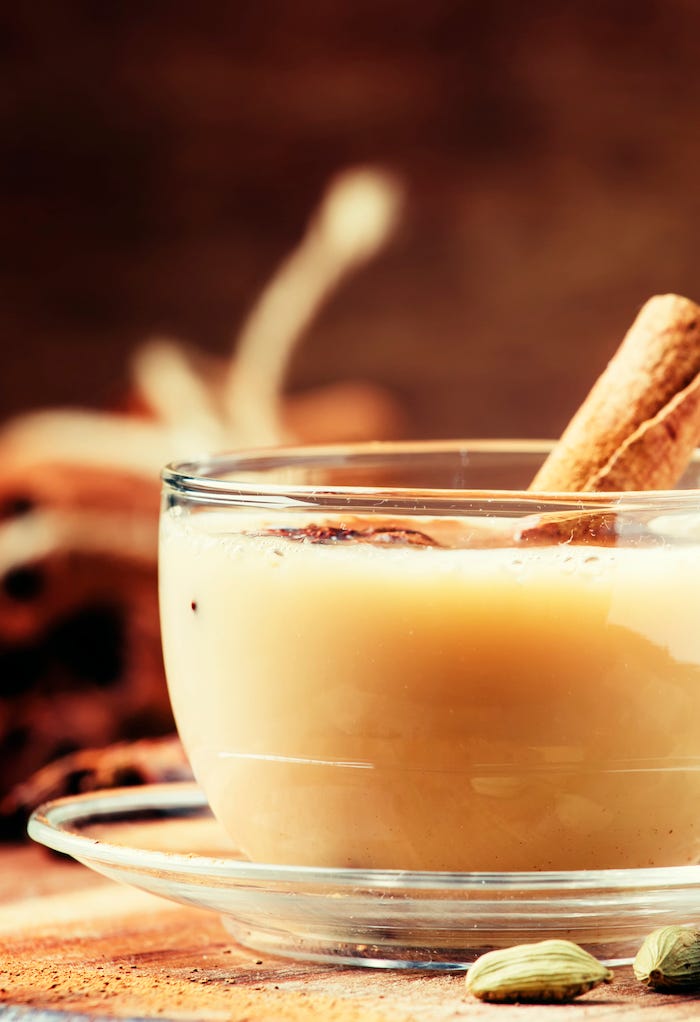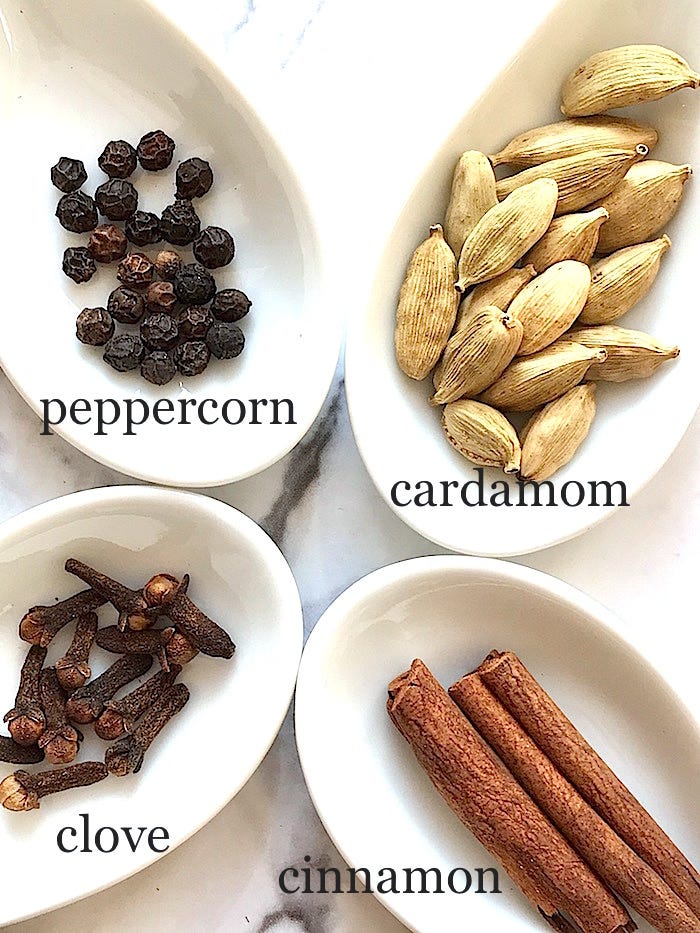I remember the first time I tried authentic yogi masala chai—it wasn’t just a delicious cup of tea, it was an introduction to a whole new way of looking at health and well-being. Based on the principles of Ayurveda, this spiced tea was more than a beverage; it felt like a connection to an ancient tradition rooted in nurturing both the body and the mind. Ayurveda, a 5,000-year-old system of holistic medicine from India, emphasizes balance, using herbal blends and spices to promote health, peace of mind, and harmony.
For me, brewing a pot of yogi chai is like carving out a moment of peace in my day. The rich blend of cinnamon, ginger, cardamom, and other spices transforms a simple routine into something meaningful—warming me from the inside and helping me feel grounded. It’s easy to make, yet it brings so much comfort and goodness into my life.
This particular recipe is inspired by Yogi Bhajan’s original blend from The Way of Ayurvedic Herbs. It’s designed to be lighter on the warming spices, making it a balanced and soothing option for any tea lover. Not only does it taste amazing, but it also offers health benefits like improving digestion, boosting circulation, and supporting the immune system.
I’m excited to share this recipe with you. With just a few common ingredients, you can experience the cozy, health-boosting magic of yogi masala chai (spice tea) right in your own kitchen.
Note: Yogi Tea is a brand, but it is also the name of a recipe — so this recipe should not be confused with the brand.
I always recommend using loose-leaf tea instead of tea bags for a better flavor and nutritional experience. For a cleaner diet, you can always choose organic ingredients.
What is detox tea?
Some people have asked me if this yogi tea recipe is a detox tea. The recipe in this post is a spiced tea designed to support your immune system. It does NOT contain cleansing herbs.
Many detox teas contain ingredients that increase gastrointestinal movement. Detox tea promotes weight loss by containing intestinal cleansing herbs such as dandelion and burdock. Dandelion tea stimulates bile production in the liver while acting as a diuretic. Increased water and bile in the intestines soften stools, while burdock facilitates bowel movements. You’ll find these ingredients popular in weight-loss teas.
Traditional Ayurvedic spiced teas are mixed with spices specifically designed to promote health and enhance a sense of calm. They're a much healthier digestive tea than all those crazy detox teas. I could drink this tea every single day!
Types of tea to use
I recommend using a robust black tea, such as an English Breakfast, an Indian Assam, or a nice Chinese Keemun. You want to select strong black tea that holds up well to milk and sugar to balance the intense spice flavors.
All spiced tea blends use cardamom, the most critical and expensive spice. The good news is that you don't need much of it to flavor your yogi-spiced tea.
Beneficial spices in yogi tea
Chai spices are packed with nutrition without the extra calories, offering incredible health benefits. Ingredients like cardamom and ginger promote digestion and circulation, while cloves and cinnamon are among the most antioxidant-rich substances on the planet, helping to fight free radicals and support your immune system. By using well-sourced, authentic spices at home, you tap into nature's healing power and enjoy the satisfaction—and savings—of crafting a genuinely nourishing cup of tea.
Cardamom is one of the world's most expensive spices, next to vanilla and saffron. It's a seed from India. The seed pod is a member of the ginger family and helps enhance digestion and reduce gas. When added to milk, it increases mental clarity and neutralizes mucous-forming properties.
Cardamom is revered for its medicinal properties, listed in Egypt’s Ebers Papyrus, dating back to 1550 BCE. The Ebers Papyrus is the Egyptian document of herbal knowledge and is one of the oldest and most important medical documents of the time, containing over 700 formulas and remedies. One such remedy is the “channel theory,” which suggests that the unimpeded flow of bodily fluids is a prerequisite for good health. Today, we know this to be true.1
Indigenous to the hills of southern India, cardamom is used in many recipes for its’ sweet and savory wellness qualities. Cardamom is known as a digestive aid and appetite stimulant. It also acts as a diuretic and antioxidant. The seed is sometimes chewed as a breath refresher.
Cardamom is a good source of Vitamin C, calcium, magnesium, potassium, zinc, dietary fiber, iron, and manganese.
An interesting tidbit - the ancient Greeks, Romans, Egyptians, and Arabs all thought cardamom contained aphrodisiac qualities and added it to their love potions. I’ve read that it helps with erectile dysfunction, which is likely attributed to its circulatory benefits.2 Maybe that’s why it’s so expensive?!
Cinnamon is a warming digestive enhancer, has antiseptic and antibacterial qualities and contains large amounts of highly potent polyphenol antioxidants. Some studies show that the antioxidants in cinnamon have anti-inflammatory activity.
Cloves are a tropical spice and another warming spice good for digestion. They reduce gas and are suitable for stiff joints due to their anti-inflammatory properties.
Cloves are frequently used to relieve gum pain and sore throats and often for an upset stomach. They are also a good source of Vitamin E (Alpha Tocopherol), Calcium, and Iron and an excellent source of dietary fiber, Vitamin C, Vitamin K, Magnesium, and Manganese.
Black peppercorns are the most well-regarded blood-purifying medicine in Asia. They help relieve sinus congestion and are a digestive aid, immune enhancer, and mild circulatory enhancer.
Ginger is a universal in Ayurveda medicine. There's nothing in Ayurveda that doesn't benefit from ginger. Ginger is a mild digestion enhancer. Ginger enhances all the systems in your body, including immune function. Ginger is used for menstrual cramps and joint pain. It's very well known as an arthritis remedy for osteoarthritis.
Ginger tea may help relieve nausea and gastric distress.
Black tea synergizes the other ingredients and tastes. The tea used in this recipe is minimal, but you can add more. Tea is a good source of antioxidants that may boost your immune system.
How to make yogi tea
It's similar to an Indian Chai but emphasizes the medicinal aspects of the ingredients and in higher quantities — more spice, less tea.
This recipe makes 4 cups of yogi tea spiced tea. By quartering the ingredients, you can easily create a single serving. Or make the entire brew and refrigerate—reheating as needed.





